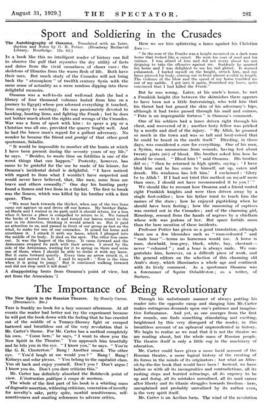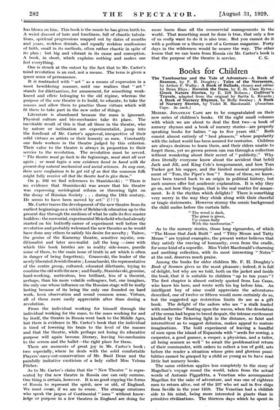The Importance of Being Revolutionary
The New Spirit in the Russian Theatre. By Mundy Carter. (Brentano's. 30s.) This is frankly no book for a lazy stunmer afternoon. At all events the reader had better not try the experiment because he will put the book down with the feeling that he has crawled out of the middle of a Tunney-Heeney fight or escaped battered and breathless out of the very revolution that is Mr. Carter's theme. For Mr. Carter has a method completely his own. "Come here," he says, "I want to show you the New Spirit in the Theatre." You approach him trustfully and he hits you in the eye. "I know you," he says. "You're like G. K. Chesterton." Bang ! Another smack. The other eye. "You'd laugh at me would you ? " Bang ! Bang ! Kidneys and solar plexus. "You belong to the capitalist class. You sit back and enjoy yourself. Don't you ? Don't argue ! I know you do. Don't you dare criticize this."
Mr. Carter has definitely absorbed the Bolshevik point of view. L'instructknz publique et coups de marteau.
The whole of the first part of his book is a whirling mass of dogmatic assertion, withering criticism, veneration of novelty for novelty's sake, petty spite, morbid sensitiveness, self- assertiveness and snarling references to adverse critics. Through his unfortunate manner of always putting his reader into the opposite camp and slanging him Mr. Carter makes outrageous demands upon one's patience and imagina- tive forbearance. And yet, as one emerges from the first few rounds, one finds something stimulating and exciting, heightened by this very disregard of the reader, in this breathless account of an upheaval unprecedented in history. We begin to realize as we read that it is not the theatre we are reading about, but the whole mass of Russian people. The theatre itself is only a little cog in the machinery of education.
Mr. Carter could have given a more lucid account of the Russian theatre, a more logical history of the creating of its forms in the minds of its originators ; but what an Alice- sit-by-the-fire book that would have been! Instead, we have before us with all its incongruities and contradictions, all its rushing steps and hurried retracings, all its urgency to be up and doing, all its mistakes unrealized, all its mad career after liberty and its titanic struggles towards freedom—here, unexplained and probably unrealized by its author even, is the very spirit itself.
Mr. Carter is an Aeolian harp. The wind of the revolution has blown on him. This book is the music he has given birth to. A weird discord of hate and loneliness, full of chaotic tabula- tions, spiritual progressions mapped out by dates of months and years, reckless denials, and equally reckless confessions of faith, small in its methods, often rather chaotic in spite of its plan ; but big and vibrant in its cause and conception. A book, in short, which explains nothing and makes one feel everything.
One is struck at the outset by the fact that to Mr. Carter's Mind revolution is an end, not a means. The term is given a queer sense of permanence.
It is contrasted with " art " as a means of expression in a most bewildering manner, until one realizes that " art " stands for dilettantism, for amusement, for something weak- kneed and effete belonging to the old regime, whereas the purpose of the new theatre is to build, to educate, to take the masses and allow them to practise those virtues which will fit them to take part in the new order of things.
Literature is abandoned because the mass is ignorant. Physical culture and bio-mechanics take its place. The inevitable result of this is that all those in the theatre, who by nature or inclination are experimentalist, jump into the forefront of Mr. Carter's approval, irrespective of their solid virtues as artists or their honesty as men. Constantly one finds workers in the theatre judged by this criterion. Their value to the theatre is always in proportion to their service to the revolution. The revolution must be served. "The theatre must go back to the beginnings, must start all over again ; or must begin a new existence hand in hand with the present-day natural mechanical and social sciences. In any case, there were confusions to be got rid of so that the common folk might fully receive all that the theatre had to give them."
On p. 102 we find references to Stanislavski : "There is no evidence that Stanislavski was aware that his theatre was expressing sociological reform or throwing light on the decay of Russian Society . . . during the 19th century. He seems to have been moved by art." (! ! ! !)
Mr. Carter traces the development of the new theatre from its earliest beginnings as a vehicle of Bolshevik education up to the present day through the medium of what he calls its five master builders : the mercurial, experimental Meierhold who had already started on his butterfly career of experiment well before the revolution and probably welcomed the new theories as he would have done any others to satisfy his desire for novelty; Tairov, the genius of the Kamerny theatre, sensitive mystic, con- ditionalist and later neo-realist (all the long —isms with which this book bristles are in reality side-issues, puerile some of them, to the main issue of truth in art which is often in danger of being forgotten); Granovski, the leader of the newly liberated Jewish theatre ; Lunacharski, the representative of the centre group, cultured, educated dilettante, trying to combine the old with the new; and finally, Stanislavski, genuine, hard-working, meticulous, less brilliant, less of a theorist, perhaps, than his more volatile colleagues, but, one imagines, the only one whose influence on the Russian stage will be really lasting because of its being the only one founded on hard work, keen observation and sound common sense. Virtues, all of them more easily appreciable after than during a revolution.
From the individual working for himself through the individual working for the mass, to the mass working for and by itself, the theatre in Russia went back to the Middle Ages, but there is evidence in Mr. Carter's book that the individual is tired of lowering his brain to the level of the masses and that the theatre, while perhaps not losing its educative purpose will again become literary, leaving bio-mechanics to the screen and the ballet—the right place for them.
There are moments of great joy in Mr. Carter's book ; two especially, where he deals with the solid comfortable Players'-navy-cut-conservatism of Mr. Basil Dean and the painfully imitative exoticism of a lady called Miss Velona Filcher.
As to Mr. Carter's claim that the "New Theatre" is repre- sented by the new theatre in Russia one can only surmise. One thing is certain, however. It is no good copying the forms of Russia to represent the spirit, new or old, of England. We must create, if we are to renew. The strange creatures who speak the jargon of Continental " isms " without know- ledge or purpose in a few theatres in England are- doing far more harm than all the commercial managements in the world. That something must be done is true, that only a few of us really want to do it is also true. But you cannot do it with a podium or a. theory out of a German magazine. Forty days in the wilderness would be nearer the way. The other lesson that we can learn from Russia via Mr. Carter's book is
that the purpose of the theatre is service. C. G.

































 Previous page
Previous page